Following the submission of the Palestinian application for UN membership and ensuing statehood recognition, the United Nations Security Council is set to discuss the matter for the second time this week on Wednesday. The topic was first brought before for discussion in the Council on Monday. According to a report on the UN News Centre website, citing the ambassador to the UN from Lebanon—the rotating president of the Council for this month—Wednesday’s meeting is expected to be when they refer the UN bid to the appropriate committee for consideration.
It remains to be seen when a final vote on the Palestinian statehood bid will take place. The final tally in the vote is also unclear, although the United States has in the past pledged to veto such a resolution, should that be necessary. The discussion comes as the Mideast Quartet—the US, Russia, the European Union and the UN—have put forth their own peace proposal.
On Tuesday, US spokesperson Victoria Nuland told reporters the Palestinian UN process has a number of steps. According to a transcript of the briefing sent out by the State Department, Nuland said, “There are quite a number of procedural, legal, analytical steps that need to be taken by the Security Council with regard to this application that the Palestinians have made.
“And as that process goes forward we nonetheless hope that the parties will use the time, use the proposal, that the Quartet has put forward to make progress in their direct negotiations track.”
Last week, an anonymous Israeli official expressed in comments to The Mideast Update the feeling that the Palestinians were under pressure, as they may not meet the minimum nine yes votes needed to force the US veto. At the time, the situation was such that the official did not think the Palestinians appeared to have enough votes. He did note that the situation was “still fluid.”
However, since then Palestinian official Nabil Shaath told the Palestinian Ma’an News Agency on Sunday that presidents from nine of the countries on the Security Council have pledged to vote affirmatively. It remains to be seen if that expectation will hold.
The discrepancy is key. Should the US be forced to veto, the Palestinians would gain a symbolic diplomatic victory even if they would be unable to gain full UN membership and statehood recognition. They would then have momentum if they turn to the UN General Assembly for a more symbolic UN status upgrade that could prove useful in an escalated diplomatic and legal battle against Israel.
On the other hand, a defeat for the Palestinians in the 15-member Council—which can be achieved by at least seven members voting no or abstaining—would be a blow to such plans. Said the Israeli official in last week’s interview with The Mideast Update, “If they can’t even get a majority on the Council, they’re exposed that there’s not actually international support for what they’re saying.”
The Security Council has five permanent members with veto powers: The US, France, the United Kingdom, Russia and China. Of the remaining nations currently on the Council, Lebanon holds the rotating presidency while there are three other nations from Europe (Bosnia and Herzegovina, Portugal and Germany); three from Africa (Gabon, Nigeria and South Africa); two from South America (Brazil and Colombia); and India.
(By Joshua Spurlock, www.themideastupdate.com, September 27, 2011)

